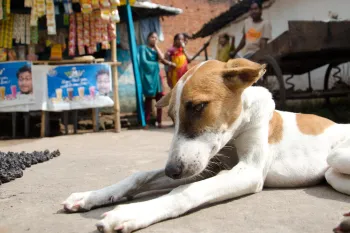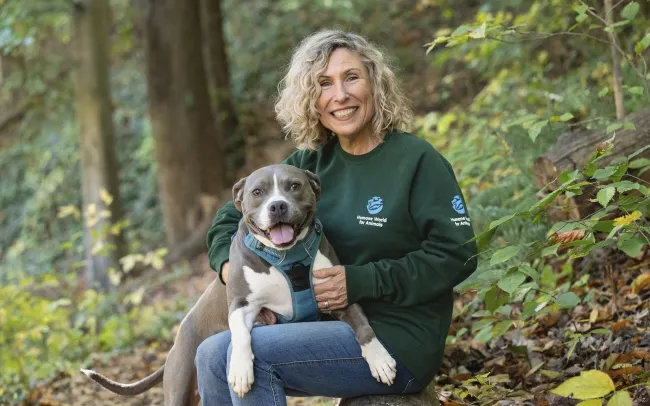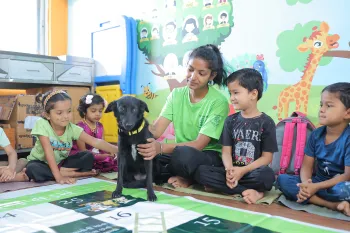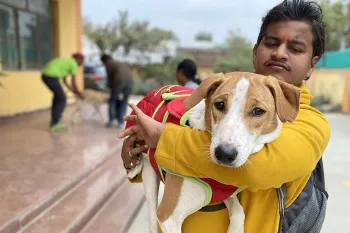Update on India street dog rulings: A three-judge bench of the Indian Supreme Court has passed an interim order, which includes upholding established rules for sterilizing, vaccinating, de-worming street dogs and releasing them back to their original locations. The order halts a previous order for the rounding up and permanent sheltering of Delhi’s street dogs and reaffirms India’s commitment to humane methods of managing street dog populations. Humane World for Animals India will continue working with communities and authorities to ensure effective, compassionate solutions.
Earlier this week, the honorable Supreme Court of India issued an order to capture all street dogs in Delhi and permanently confine them to shelters, with no return to their home territories. This order came two weeks after a completely contradictory order by another bench of the apex court. Then, today, a special bench of the court initiated a hearing on the street dog removal order, and we’re hopeful for a balanced and compassionate outcome.
At Humane World for Animals, we champion humane, evidence-based approaches to animal welfare, so we find the order the court issued earlier this week deeply troubling. It is not only out of step with India’s advanced animal welfare policies, which safeguard the rights of street dogs, it risks undoing decades of progress in protecting both people and animals.
The court’s decision comes after media coverage on serious dog bite incidents, many involving children. These concerns are real and must be addressed, but mass removal of dogs is not the answer. Our Humane World for Animals India team sent a letter to the Chief Justice of India saying as much and offering evidence to continue humane management approaches.
Of course, public safety matters. And so does science and intelligent policy, which can help prevent threats to public safety. Experience and science show that removing dogs:
- Doesn’t prevent bites in the long run. New, unsterilized and unvaccinated dogs move into the vacated territories, and the cycle of danger and harm to people and animals continues.
- Threatens public health. Removing vaccinated dogs undermines rabies control programs, allowing unvaccinated dogs to take their place.
- Breaks the important social bonds between communities and the dogs they know and care for.
- Is unfeasible given the National Capital Region’s (which includes Delhi, Ghaziabad, Noida, Gurgaon and Faridabad) estimated 1 million street dogs and the cities’ extremely limited shelter capacity.
Relocating dogs doesn’t reduce conflict; it disrupts the balance and spreads the problem elsewhere. What India needs is not mass confinement, but high-impact, strategic Animal Birth Control programs rooted in science and compassion.
We know what works because we’ve done it.
India has been a global leader in humane dog population management and rabies control. Animal Birth Control programs combining sterilization and vaccination are endorsed by the World Health Organization and enshrined in Indian law.
When implemented well, these programs work. We have seen this in several parts of the country:
- Uttarakhand: Partnerships with local authorities have shown a 40% decline in the street dog population of the state’s capital, Dehradun. A sterilization coverage of over 90% in three cities—Dehradun, Mussoorie and Nainital—and a reduction in complaints from all the cities.
- Lucknow: Sterilization and vaccination have reached 83.4% of the city’s street dogs, dramatically reducing dog density and improving safety.
- Vadodara: A targeted Animal Birth Control program covering 86% of street dogs has reduced conflict, boosted rabies control and strengthened community trust.
At all these locations, Humane World for Animals India has been working with communities on raising awareness about dog behavior, rabies, ways to decrease conflict and ways to increase community supported sterilization and vaccination.
These results are not the exception; they are the outcome of investing in humane, science-based solutions.
We all want safer streets and healthier communities. But we can only achieve that through approaches that work in the long term, not reactionary measures that cause harm, strain resources and undermine public health.
What is heartening is to see that communities, politicians, influencers, animal advocates, celebrities and the people of India are speaking up for the dogs and their communities. We hope that their voices are heard. India has the knowledge, the tools and the experience to lead the world in humane street dog management. Let’s build on that legacy, not dismantle it.
Keren Nazareth is senior director of companion animals at Humane World for Animals India.




